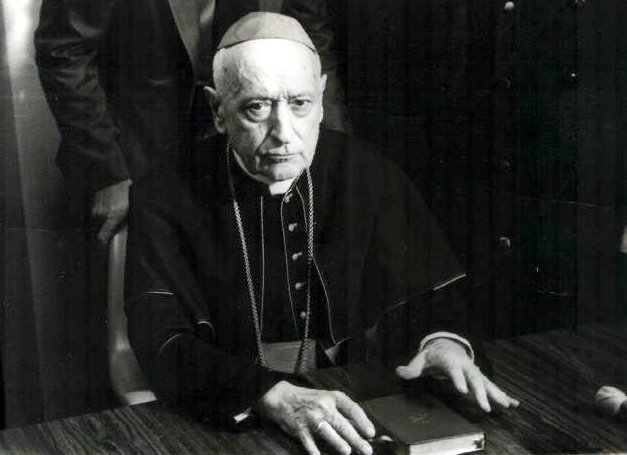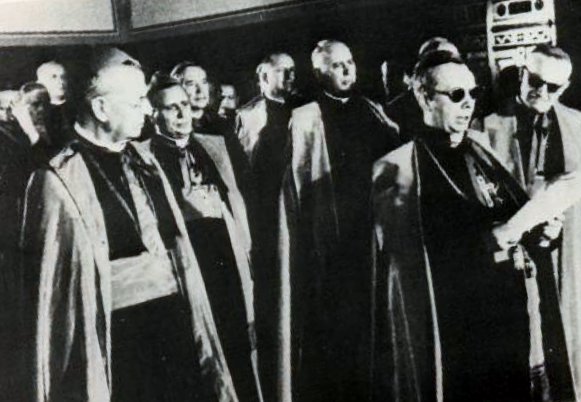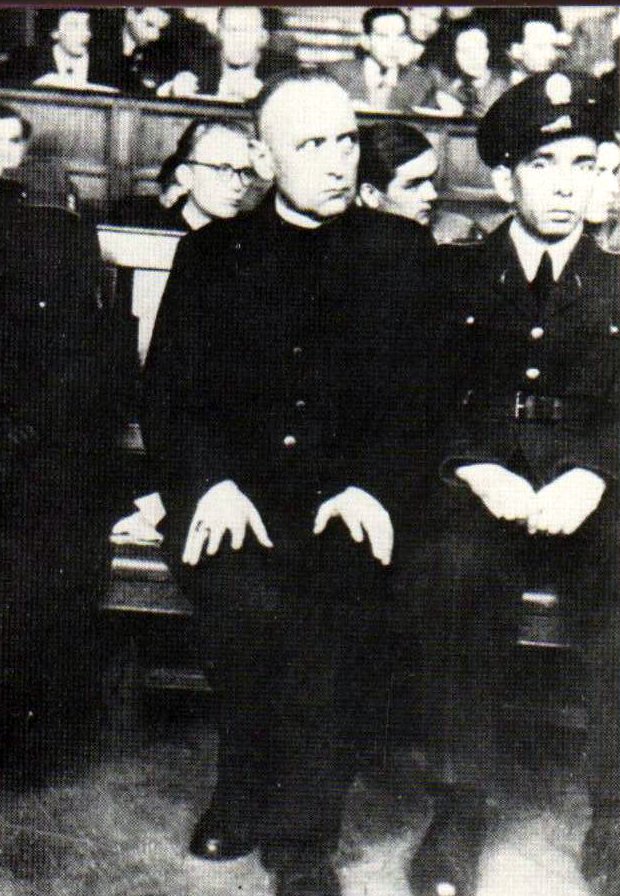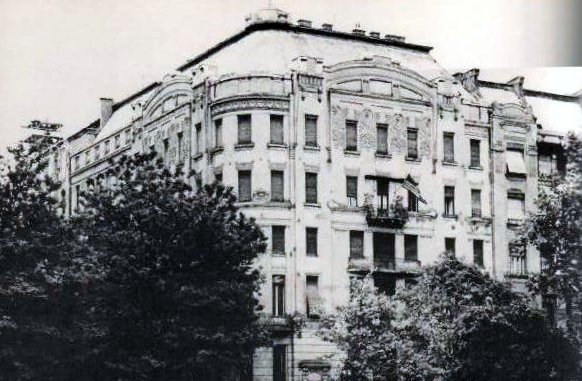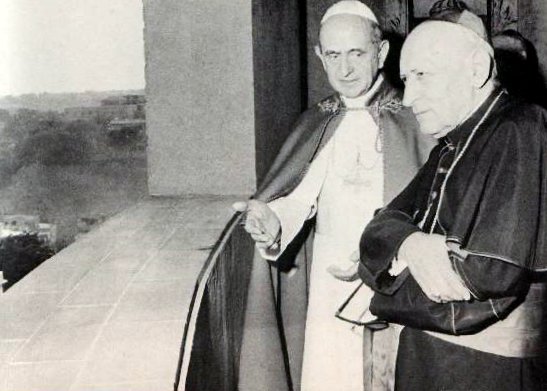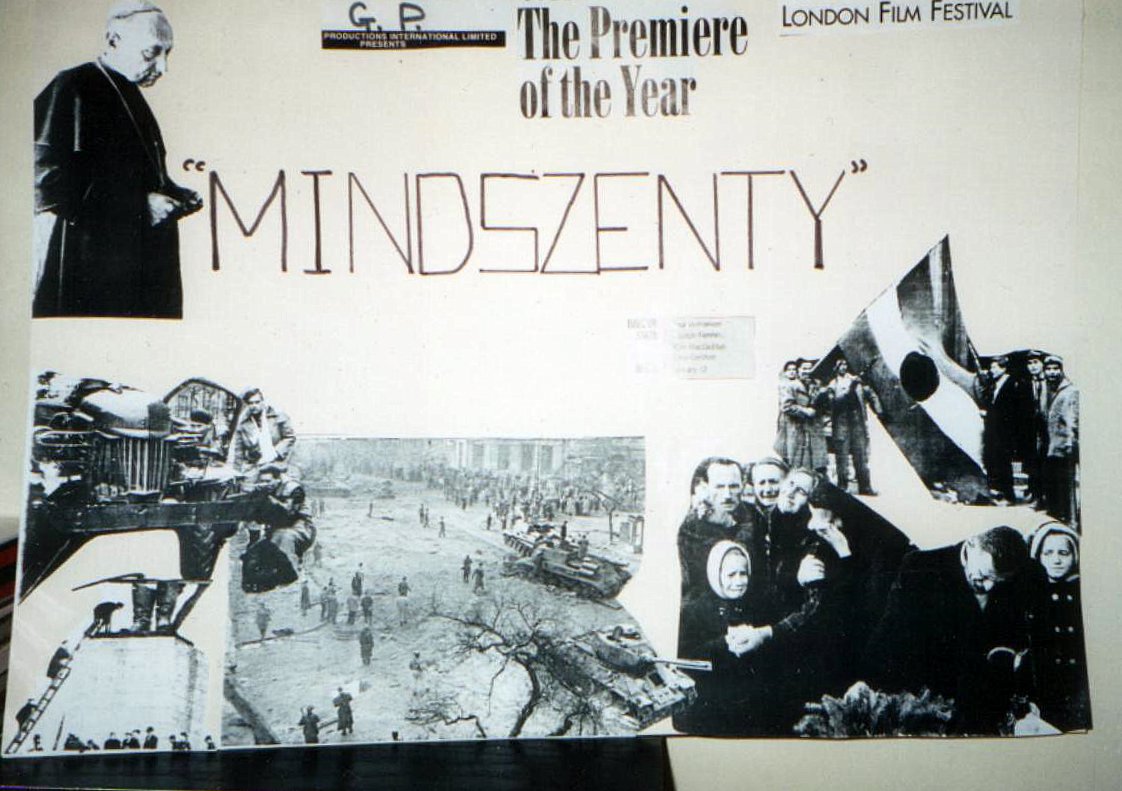Cardinal Joseph Mindszenty: “Mind Games”
Jozsef Mindszenty was born on the 29th March 1892 (it should be noted that his family name was actually Pehm.) In fact, the town he was born in was called Mindszent but for political reasons, during the war (1941) he changed his surname to that country region of his birth.
On a personal note, I also share the same birthday with him. But it was during the mid-1960s, when I was living in South London, that the occupants of next-door were themselves Hungarian refugees, who had escaped after the uprising against the Russians in 1956. It was through them I first heard about the Cardinal.
I remember they were a delightful family named Zombori, and Mr. Z and I became good friends. He even taught me some snatches of Hungarian but alas I seem to have forgotten most of it today. I do remember an angry scar ran down his left cheek that had been inflicted upon him by a Russian soldier.
Shortly after this incident, he was fortunate enough to be able to escape to England with his wife Margaret and young family. He also told me many stories of that great Hungarian symbol of resistance, Cardinal Mindszenty.
He remembered when Mindszenty who, after he had been freed by the partisans after an eight-year period in prison, mounted a captured Russian tank to address the Hungarian people.
However, Mindszenty’s clash with authority went back soon after his ordination when he was arrested on a minor misdemeanour and would occupy a cell for a few days before returning home. In 1944 soon after being consecrated a bishop under the orders of the pro-German Government, Mindszenty was arrested again.
This time he would spend six months in prison, but with the Russian advance on Hungary, he was able to quietly leave prison (there has been a rumour that as bishop of Veszprem he did not do enough during the war to help and aid Jewish families during frequent Gestapo roundups.)
Postwar Hungary was now a different political theatre both for the Hungarian people and the Catholic Church. The pro-Moscow Government were heading for a showdown with all known opposition. Now the popular communist slogan being shouted on the streets was: “We want work, bread, and the rope for Mindszenty.”
The Communist party, through their notorious secret police, were preparing an arrest for Mindszenty; eventually, they arrived on the evening of December 26th 1948, when a large body of police stormed the Archbishop’s house. Led by Lt. Col. Decsi, then head of the Political Police, he calmly walked up to Mindszenty, poked him in the chest and announced: “We have come to arrest you.” No warrant was offered.
Later, however, Janos Kador announced that Mindszenty had been arrested on suspicion of activities hostile to the Republic, high treason, spying and currency speculation (that’s always a good one!)
(He despised these pro-KGB bishops and priests, as they take loyalty oaths to their new communist ‘masters by calling them ‘apostates’ and ‘infiltrators.’ They look like a bunch of gangsters, with their expensive Gucci sunglasses)
In Memoirs, he claims: “I regard politics as a necessary evil in the life of a priest.” I suspect that the Cardinal in those hectic days after the war was much more than a passive spectator of passing Hungarian Politics. It was a turbulent time, with many reactionary political parties attempting to restore the Monarchy to Hungary, certainly, Mindszenty would be pro this gesture-he certainly was no friend to godless Marxism.
Equally the communist Government who had just got a foothold in the life of Hungry would do all they could to sustain their steel grip on the country and its people. This was indeed a goulash of murky Hungarian politics with the church and state acting as head cooks-each trying to stir the broth of forced change and outmanoeuvre each other.
Mindszenty would naturally deny all charges later in court, but by then he was a guest at No. 60 Andrassy St, the domain of the dreaded secret police. Today I believe it’s the swanky address of the Howard Johnson Hotel.
Things certainly change, don’t they? It would be a long 23 years before he would breathe the fresh air of freedom. And with the sentence of penal servitude for life, he might not even sample this. Perhaps even expiring in prison.
(Look at his eyes. He was drugged with something, during this show trial)
Of the eight long years in prison, much of it in solitary confinement under the communists, Mindszenty would suffer terribly, both physical and mental pain. Most of the experiences he writes about in Memoirs (much I suspect he prefers to gloss over and erase from his mind.) His book must have gone through many re-writes and editing during his long stay in the US Embassy.
There is no doubt from what I have researched that ‘truth drugs’ were forcibly administered to him by Soviet-trained interrogators and doctors. One such drug that could have been used was “Mescaline” and maybe a cocktail of others was also tried out. This would later allow Mindszenty to comment of that period: “Without being aware of it I had become another person.” How frightening. Or rather like the Manchurian Candidate syndrome. Incidentally still being used today in other torture centres throughout the world, i.e., Guantanamo Bay, Cuba springs to my mind.
I also suspect that the cruel episode when he was forced to wear the costume of a clown in front of “female secretaries” was some form of contrived sexual torture, again for obvious reasons he cares not to go into to much detail, and who can blame him.
The use of prostitutes could be another form that was initiated and authorised against him. The fact that he was a priest would give the authorities a great delight in watching him participate in this established use of human degradation. (These sessions may even have been filmed by the KGB.)
The depravity that he was subjected to must have affected his mental condition – always a highly-strung man – I suspect that he took comfort in prayer and of course his lifeline, his mother. He seems to have had a sense of humour (always needed in prison, I would imagine.) For instance when on a Monday morning a gipsy in the next cell was being escorted to the gallows, slowly turned to the watching Mindszenty and said: “Well this is certainly a great way to start the week.”
Later after arranged visits from his mother were suddenly cancelled for no reason, he undertook a seventy-five-hour hunger strike. With him, it seems there would be no space for compromise.
In 1956 the Hungarian revolution flared up in that occupied country.
After a welcome release from prison at Felsopeteny by loyal Hungarian soldiers under Major Pallavicini (who himself would later be executed by the Russian’s), Mindszenty returned to Budapest to a jubilant reception by the waiting Hungarian crowds. He would in fact sample only four days of freedom there. He spoke to Hungary and the world, but the tide of liberation was fast turning now. Russian tanks that had previously withdrawn were shelling Budapest and the secret police were returning and with a vengeance.
For Mindszenty it meant seeking asylum in the nearest embassy, which happened to be an American one. Within half an hour of Mindszenty presenting himself with a request for asylum, President Eisenhower had granted permission for the new guest to take up occupancy.
(Home for Mindszenty)
There he would remain on the top floor of this imposing building for the next fifteen long years.
Permission was granted for his mother to visit him four times a year, yet when President Nixon, on a visit to Budapest held talks in the embassy next to the Cardinal’s room, he did not come to visit him. Today he holds the record of a refugee’s longest residency in any foreign embassy. He also, I suspect, made use of the embassy’s excellent library to prepare and research the groundwork for his future autobiography Memoirs, completing them later on release in Austria.
Through the long years during his stay in Budapest, the secret police stationed outside the embassy in several cars with engines running in readiness to arrest the Cardinal if he should leave the American residence, which he never did, and during all this time the Cardinal kept fit until the 1960s when health scares flared up. He also read it is reported, 26 Hungarian newspapers each day as well as assorted English and American newspapers.
By the 1960s Mindszenty was becoming the unwelcome guest of the American’s but the Catholic church under John XXIII and Paul VI had opened an unhealthy dialogue with communist regimes. It would be named “Ostpolitik.” Suddenly communists on both side of the Iron Curtain welcomed “Pacem in Terris.” (John XXIII’s papal encyclical.)
Under Secretary of State, Cardinal Cassoroli the now well-oiled Vatican political machine moved slowly to accommodate communism. Mindszenty hated it, of course, arguing that, “it brought nothing but gains to the communists.” Of this argument, the wily Cassorioli would say: “Mindszenty is like granite and can be just as disagreeable as granite.”
But it was all part of the ecumenical, one world religion, planned and executed so long ago by Cardinal Bea (pre-Vatican II) and its success was now accelerating.
On September 28th 1971 the world was surprised that the Cardinal had been given a full diplomatic pardon. He was now free to end his residency in the embassy. The following day he left Budapest flying to Rome, to be met by the Vatican Secretary of State, Cardinal Villot (himself a noted Freemason and member of the Italian P2 lodge. Also accused by many authors as being deeply involved in the mysterious death of John Paul I.)
(He always felt that Paul VI and others had let him down, with their pro-communist stance)
But for Mindszenty it was his first full day of freedom. And where better to spend it than in Rome, but never again would he return to his native homeland during his lifetime. Now he was a refuge without a country. Sadly the fate of so many today.
On a personal note, I remember the news of his release very well. I was at that time living and studying the cello in South London under a young Hungarian cellist, Thomas Igloi, then considered a serious musical rival to Jacqueline DuPre.
The news of the Cardinal’s unexpected release caused him to do a little dance around his music room clutching a copy of the London Evening Standard – it was then headline news.
When I arrived for my afternoon lesson, I shook his hand and informed him how pleased I was for him and his family. One week later Thomas Igloi died in his sleep, he was 31 years old.
Four years later the ageing Cardinal himself died at 83-years-old.
During the final years of freedom, he would travel extensively around the world meeting Hungarian communities, politicians and Presidents and always warning of the hidden dangers of communism. To the youth of the world, he declared: “Always stay just as young as you are. Let us then rejoice while we are young.” (Nothing about being born again ever came from this so-called ‘prince’ of the church.)
His last earthly words spoken on 2.15 pm, on 6th May 1975 were, it is reported: “The Lord’s will be done.” Then he was gone. His era was over.
My personal regret was that he probably died unsaved. For was this martyr priest, as he was called, ever regenerated? I seriously doubt it, and would he have listened to the command in John 3:3-5 to be born again? Who can say? And do we now care? Today this is our era.
As Bible-believing Christians we are commanded to bring the Good News of Jesus Christ to all. Our ministry is primarily out and about on the streets. Woe to us if we forget to do so (1 Cor. 9:16.)
But as a Hungarian patriot, he knew loneliness, bravery and betrayal and for what he went through I salute him. How I would survive under such torture I do not know. Courage, I believe, forces all of us to react in different ways when our faith is tested. Sadly many fall at the first fence. But not him it seemed.
As a result of Perestroika, the Berlin Wall would finally collapse. This allowed in 1999 the body of Joseph Mindszenty to be flown from Vienna to Hungary. Today he lies buried in the country of his birth. Joseph Pehm had, at last, come home.
Sources
Any student of Mindzenty should read Memoirs for an exhaustive background to the man and his career.
Cardinal Mindszenty, by J. Houston
Cardinal Mindszenty: Confessor and martyr of our time, by Jozsef Kozi-Horvath
The Papacy Today, by Francis X. Murphy, C.S.S.R, 1981
(My mock-up promotional banner)
Pius XII had always been a guardian of orthodoxy in his church. To him, communism was “godless.” Then with the election in 1958 under Roncalli the thaw set in; now communists were called “men of good will.” How this must have annoyed Mindszenty, who had known the love of these men with a punch in the mouth, kidneys and testicles when he was in prison, and how they must have laughed at him and others with their new name given to them by the pope.
Paul VI had always been on the left, politically, not so much on the orthodoxy of his church.
But with the publication of his encyclical Populorum Progressio in 1967, open socialism which through his church’s “Justice and Peace Commission” (which I chaired in for many years), was a blueprint for future church activity. Very much endorsed by John Paul II.
It’s no coincidence to me that The Wall Street Journal had called the encyclical “souped up Marxism.” Their words, not mine!
And the pope’s political support for the United Nations “was not lost on right-wing Catholics who regarded it as an impotent and interfering body” (The Runaway Church, Peter Hebblethwaite, 1978.)
I couldn’t agree more. When Christ returns that body (the UN) will be swept away in minutes. Hurrah!
Or to a final quote from former English Jesuit, Peter Hebblethwaite in his book:
“The encyclicals letter of Pope John XXIII which provided the theoretical justification for cautious dialogue and collaboration with Marxists. Marxist is a looser term than Communist” (p.164.)
These were, I am sure, his future principles for the church.
Since John XXIII the Catholic church swung to the left and is still stationed there today.
How this must have upset and annoyed Mindszenty who had tasted the fist of Marxism, which I do not believe Roncalli or Montini ever did. And don’t forget in 1963, who did the pope received in the Vatican for talks? No less than Khrushchev’s son in law, and at a time when Christians and Catholics, then living behind the Iron Curtain, were suffering torture in psychiatric hospitals and gulags.
Will someone please tell me what was happening in those far away days of Vatican II? Those problems sown then are still with us today and will be so until the return of Christ.
We at this ministry look forward to that day soon to happen.
Postscript
Vatican II finally brought the Catholic churches future teaching finally in line with modern thought and attitude. “Mission Accomplished,” proclaimed the theologians of the council.
But this was nothing new, indeed under pope Leo XIII partial blessing was given to French and Italian theologians to, “bring the churches teaching parallel with contemporary culture.”
So what was their hidden agenda formulated so long ago? Simply for their Church to adopt recent advances in science and sociology teachings.
Even cardinal Newman in England seemed to favour such a gesture, but always he reasoned with caution. But how cautious is cautious I have to ask?
Quite simply the church had to be modernized and quickly! Out would go ecclesiastical structures, bring the ailing liturgy up to date, promote a deeper concern for the poor through social teachings, then be urged upon the church faithful through prayer and penance.
But doesn’t this rather sound like those clever discussion papers submitted by Ratzinger and Kung and others for Vatican II to examine in the early 1960s, and later successfully implement through the council.
A century ago this group, then known as “Modernists” supported the dangerous Darwinian thesis of evolution, thus denying the Biblical story of Creation and much more. In fact, since John Paul II this Darwin theory is safely ensconced in the churches thinking (“More than just a hypothesis”, he said), even his successor Ratzinger has supported such a covert Illuminati doctrine it seems.
Of course in the past those openly opposed to this were the traditionalists – they then, of course, had the upper hand and saw all this as nothing more than socialism by the back door. I think they were correct. But they didn’t win the argument.
Much of this dangerous ideology had derived from the French Revolution (or ‘the Great Terror’ as it should be called.) This would feed into the great syllabus of errors debate. (In fact here in England, pre-Vatican II priests still had to swear that they would in no way support or promote modernism.)
In 1907 a decree from the pope called Lamentabli finally condemned the dangerous science of modernism. But it would resurface again under a new name Ecumenism! One such priest who came under suspicions from the Curia was young Angelo Roncalli-even then it seems his position was with modernist’s teaching, maybe that’s why he was dispatched early in his career to far away Bulgaria, only later to re-enter the church stage as Pope John XXIII.
One of the first things he did, according to author Francis X Murphy, was to visit the consistorial congregation and examine his own file in that office. I wonder what happened to those files after his visit?
The Catholic church, in my opinion, is not a rock. Rather its recent conflicts in the courts and the sex scandals lead me to suggest that it is on the rocks!
In Rev. 17:6,7, the Apostle John refers to a disgusting woman drunk with the blood of the saints. And look what happens to her! And just remember since 325-1870, 50 million saints perished under the Catholic Church and her mercenary armies according to Peter Ruckman (The History of the New Testament Church, Vol. 1, p. 377.)
I strongly urge all Catholics to get out of such a cruel system, now, today, do not delay!
Turn instead to a loving fulfilling relationship with Christ. Remember 7,000 people die suddenly each hour.
Few are expecting it!
And remember that weeping crowd on the wide road in the Gospel of Matt. 7:21-23: “Lord, Lord,” they cried. Dear friend, please make sure you are you one of these lost souls on their way Hell. They also weren’t expecting it either!
Time is short!
GPB
September 2006
(All Rights Reserved)
